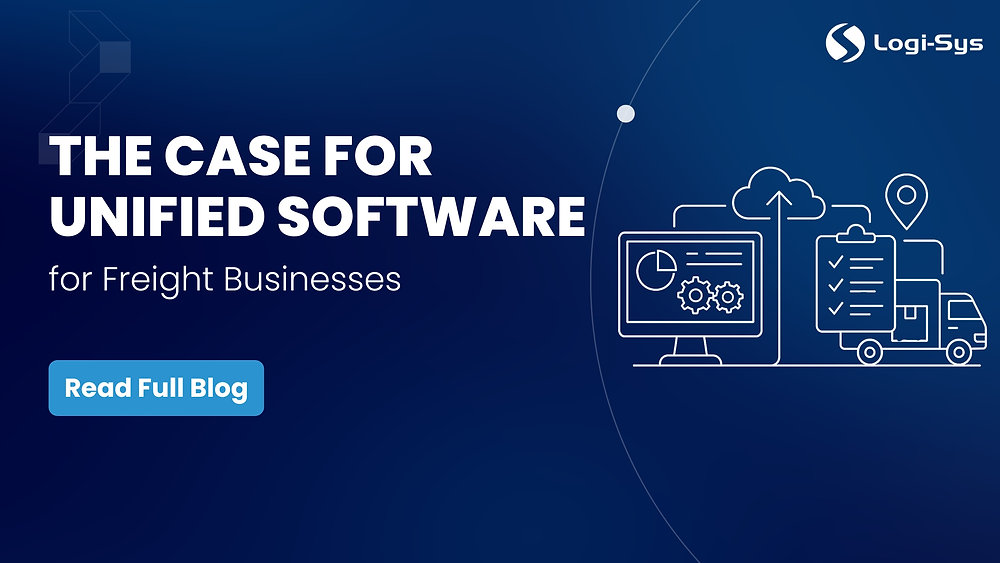
Global forwarding operations are no longer linear. A single shipment today moves through multiple legs, jurisdictions, and touchpoints: from airports, ports and customs to transporters, warehouses, and banks, all while being tracked, billed, and updated in real-time. For freight forwarders, success depends not just on moving cargo but on orchestrating complex processes across departments, branches, and systems.
However, many forwarders still operate with disconnected tools: Excel for job costing, standalone systems for accounting, and manual methods for tracking. These silos create inefficiencies, cause revenue leakage, and make scaling difficult.
This is why leading freight businesses are adopting unified software for freight. Not a patchwork of tools, but a centralized digital platform that connects freight operations, financial accounting, sales, and compliance—on a single source of truth.
Why Forwarders Must Think Beyond Fragmented Systems
Every function in a freight company—sales, operations, finance, and compliance—is interdependent. A missed update in operations can delay billing. Delayed invoices slow cash flow. And misaligned quotes can affect profitability.
A connected system improves throughput at every step.
With a modern, businesses can:
-
Create a job directly from a quotation, without re-entering data
-
Track actual vs. estimated costs in real time
-
Trigger invoice generation based on shipment milestones
-
Reconcile collections and credit status from the same screen
-
Access profit-per-job, customer performance, and sales conversion dashboards
Disconnected systems simply can’t support this level of transparency. That’s why more freight businesses are turning to trade-specific freight ERP software.
What to Expect from a Unified Freight ERP Software
A true freight ERP must cover the full lifecycle: quote to delivery, booking to invoicing, lead to collection. It should support multi-modal shipments, handle cost allocation and billing without manual intervention, and provide real-time updates to all stakeholders.
Key capabilities of a freight-specific platform include:
-
Multi-modal shipment management (air, sea, and land; export/import)
-
Auto-generated documentation, including AWB, HBL, BL, and manifests
-
Automated job costing and margin tracking
-
Multi-currency billing, taxation, and region-specific compliance
-
Customer and vendor visibility portals
-
Integrated sales CRM, with lead, opportunity, and conversion analysis
-
Live dashboards for job status, invoicing, receivables, and profitability
This level of integration is essential for freight businesses operating across regions, currencies, and regulatory environments.
Logi-Sys: The Intelligent ERP for Freight Forwarders
Logi-Sys is a unified, cloud-based ERP platform developed exclusively for freight forwarders. It is not a generic ERP adapted for logistics—it is purpose-built for the freight industry, with global capabilities and deep operational controls.
Logi-Sys supports export and import operations across air, sea, and road freight. Users can manage consolidated, direct, and back-to-back shipments, automate documentation, assign job costs, and track margins at each step.
Shipments are visible at every milestone, from booking to POD. The system integrates seamlessly with airline, shipping line, port, and customer systems.
Unlike many platforms that require external accounting tools, Logi-Sys includes a built-in financial module. It manages multi-branch and multi-currency transactions, generates audit-ready reports, reconciles accounts automatically, and connects directly with jobs to eliminate invoice mismatch.
It also includes credit control, payment reminders, tax compliance (IRBM, ZATCA, BIR), and real-time profitability reports.
-
Sales, CRM & Customer Visibility
Logi-Sys includes an advanced CRM that captures leads, tracks conversions, and links every opportunity to a quotation and job. Users can analyze sales performance, run targeted campaigns, and offer clients real-time shipment tracking, document access, and account summaries.
-
Mobile Access and Scalability
Logi-Sys offers mobile functionality for job updates, approvals, alerts, and finance actions. It supports businesses from 5 users to 5,000+, across multiple countries, currencies, and time zones.
This makes Logi-Sys more than just software for freight—it is a digital infrastructure tailored to the real-world complexity of logistics.
Why Forwarders Choose Logi-Sys Over Legacy Freight Tools
While many legacy systems offer partial functionality—operations only, or finance only—Logi-Sys delivers a fully integrated experience. Unlike systems that require third-party accounting, manual compliance filing, or disconnected CRMs, Logi-Sys includes all modules natively.
Forwarders using Logi-Sys report:
-
Reduced billing errors through job-linked invoicing
-
Improved cash flow with credit control and automated follow-ups
-
Faster shipment execution, thanks to mobile alerts and task-based workflows
-
Greater customer satisfaction, driven by live milestone visibility and branded portals
-
More informed decisions, using real-time profitability and branch performance analytics
Built for operational depth, financial discipline, and customer service, Logi-Sys is the freight ERP software that forwarders can trust to scale globally without creating complexity.
Conclusion: One Platform. Complete Control.
Freight forwarding is about synchronizing people, processes, and data across countries, currencies, and customer expectations. A unified ERP for freight forwarders like Logi-Sys enables this synchronization. It replaces disjointed tools with one freight-specific platform—built to manage the operational, financial, and commercial needs of growing logistics businesses.
For forwarders looking to scale with speed, precision, and profit, Logi-Sys is the software for freight that brings it all together.
